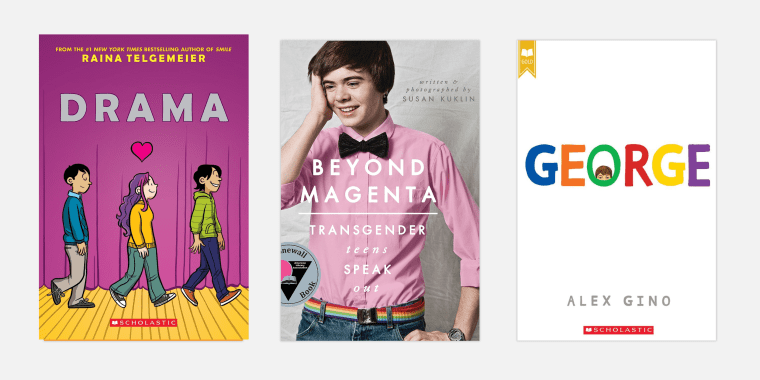Nearly 600 books spanning a variety of genres and reading levels were the target of censorship attempts at libraries, schools and universities last year, and 8 out of the 10 that made the American Library Association’s “Most Challenged Books” of 2019 list shared a common denominator: LGBTQ content.
This latest ranking marks the fourth consecutive year that books with lesbian, gay, bisexual, transgender and queer storylines composed at least half of the list, which is included in the association's annual “State of America’s Libraries” report.
“Books with LGBTQ characters and themes have regularly been among the most challenged,” Deborah Caldwell-Stone, director of the American Library Association's Office for Intellectual Freedom, told NBC News. “The trend dates back to the ‘90s, when Nancy Garden’s ‘Annie on my Mind’ was banned by a school board in Texas, and we’ve seen an increase in organized efforts to pull these books from school and community libraries in recent years, especially books that include transgender characters.”
The library association reported a 17 percent increase in the number of books challenged in 2019 compared to the year prior, and noted its report is just a "snapshot of book challenges," adding that surveys indicate 82-97 percent of book challenges "remain unreported and receive no media."
This year marked the first time Daniel Haack’s “Prince & Knight,” a children’s book that features a gay fairytale wedding, appeared on the list. Haack told HuffPost that he was inspired to write the book — which was published in 2018 as the lead title in a partnership between LGBTQ media advocacy organization GLAAD and the children’s book publisher Little Bee Books — because he wanted to show LGBTQ children that they “are just as capable of being the brave heroes, and are just as worthy as anyone of being in love.”
Susan Kuklin’s “Beyond Magenta: Transgender Teens Speak Out,” which, as its title suggests, includes interviews with transgender and gender-nonconforming teenagers, reemerged on the list, after not appearing on it since 2015.
Most of the books featured on this year's list are repeatedly among the most-challenged, including Alex Gino’s "George." The award-winning, young-adult novel, which tells the story of a transgender girl coming to terms with her gender identity, had been restricted to “avoid controversy” and “for LGBTQIA+ content and a transgender character” for the last four years.
Jessica Herthel and Jazz Jennings’ “I am Jazz,” Raina Telgemeier’s “Drama” and Jill Twiss’ “A Day in the Life of Marlon Bundo” have also made repeat appearances on the list. All three books feature gay or transgender characters and have been among the top 10 most-challenged books since 2016.
In arguing for the removal of these books from school and library shelves, challengers claimed that schools and libraries should not “put books in a child’s hand that require discussion” and expressed concerns that such books are “designed to pollute the morals of its readers” and are “a deliberate attempt to indoctrinate young children.”
Yet, Stone said that efforts to censor such books are not based on a “legitimate” desire to ensure children are reading age-appropriate texts, but rather, on one person or a group’s attempt to undermine the diversity of and inflict their viewpoint on an entire community.
“The challenges we’ve been tracking are based on the belief that some people can dictate what everyone should read, and I wouldn’t deem that reasoning legitimate,” Stone said. “These books are developmentally appropriate, and families and children who need and want to read them should have access to them.”
Other books included on the list included Margaret Atwood’s “The Handmaid's Tale” and J.K. Rowling’s “Harry Potter” series. Though the American Library Association says they were targeted for “vulgarity and sexual undertones” and depictions of witchcraft, respectively, both also feature gay characters.
According to the Cooperative Children’s Book Center, less than 4 percent of the nearly 4,000 children’s books it analyzed “had significant LGBTQ+ content” in 2017, the most recent year for which data is available.
“LGBTQ families, like mine, are too often left out of programming for children and families, creating hardships for LGBTQ parents and children alike,” GLAAD President and CEO Sarah Kate Ellis said in a statement. “These beautiful titles should not be challenged, they should be celebrated, but this list is an important reminder of the work ahead for LGBTQ families.”
While physical libraries have been closed amid the coronavirus outbreak, Stone said that their role in providing individuals and families with resources extends beyond their physical spaces. While the library association anticipates less reports of banned books during the lockdown, it will continue to support libraries who are dealing with calls to ban certain books, especially during National Library Week, which is from April 19-25.




